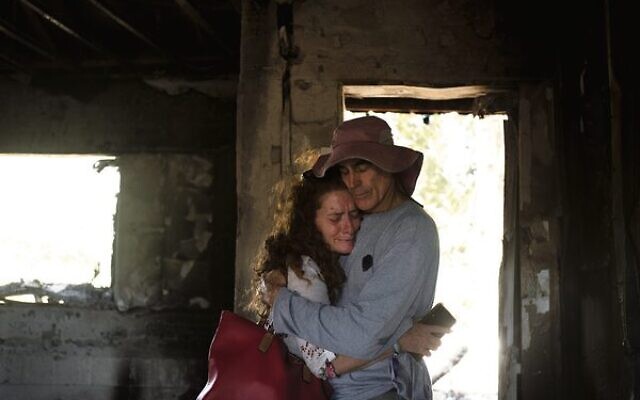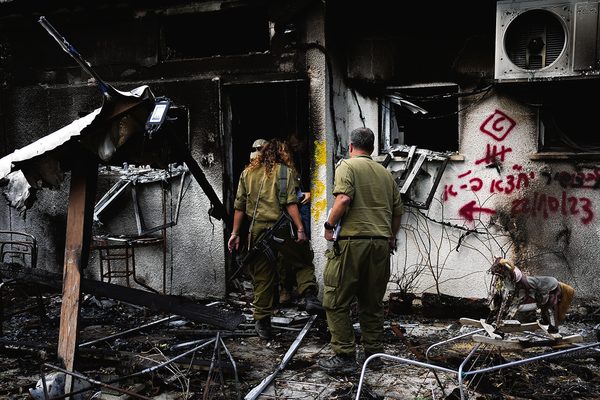Australian counselling Nir Oz community
“We try and take aspects of trauma that people go through and try to understand that that’s maybe what they’re going through," says Debbie Maissel.

“There’s no frame of reference for this kind of trauma,” Debbie Maissel says from Eilat, where she is the designated social worker for the shattered Kibbutz Nir Oz community.
With almost a quarter of its residents either murdered or kidnapped – 180 people out of just 400 – Nir Oz was one of the most horrific sites of the October 7 massacre by Hamas. Those who survived have evacuated their burned and destroyed homes to find temporary refuge in Eilat and have begun the long process of mourning.
“My work as a social worker, aside from accompanying some of the families of the people who were taken hostage and some of the families where people were murdered, is also to try and help the community regain some of its autonomy,” Maissel tells The AJN.
Maissel was born in Sydney, attended Moriah College, and made aliyah four decades ago. She lives on Kibbutz Alumim with her husband and four children, but because of its close proximity to Gaza, her community has been evacuated to Netanya, where they will remain for at least the next six months.

But Maissel says the residents of Nir Oz are facing a far longer wait before they can return to their kibbutz, which needs to be almost entirely rebuilt.
“The kibbutz was basically destroyed, so they won’t actually be able to go back for something like three years,” she says.
“They’re now in Eilat, but the next stage for them is they’re going to be moving into big apartment buildings in an area just near Kiryat Gat, which is about an hour from the kibbutz. They’re going to have to set up their community in apartment buildings, which will be very different for them in terms of how they used to live in a very rural environment.”
While there is a timeline for their return to their kibbutz, the process of trying to heal from the emotional trauma the community has suffered – and continues to suffer through – is far less predictable.
Maissel has been hearing their stories and, through their vivid descriptions of how these innocent Israelis were murdered or tried to survive, she has been thrown back to the stories of how her parents escaped Europe during the Holocaust.
“Just hiding children in covers under the beds while they could hear these terrorists in their house, trying desperately to get to them and kill them,” Maissel says.
“Trying desperately to kill, by setting the house on fire so that they would have to leave the safe room and … just awful, awful stories. It’s very hard to even put a word to it, or to imagine that human beings could act like that to other human beings. That’s why it really reminded me a lot of the Holocaust and just how cruel and savage some people can be.”
Trying to counsel and comfort these deeply traumatised people is incredibly challenging because there simply is nothing in the textbooks for professionals to be guided by.

“There’s no precedent for how we can work [through this], so we’re basically working and learning together,” Maissel says.
“We try and take aspects of trauma that people go through and try to understand that that’s maybe what they’re going through. The country very quickly set up all sorts of guidelines about how things were going to work, so the families of the hostages were straightaway given a liaison officer from the army who stayed with them all the time.
“Then we, as social workers, come in and try and give the family and the hostages any sort of help we can, whether it’s to refer them to trauma therapy where they can do it as a family or as an individual. The children can get therapy and their parents can get therapy about how to help the children.”
Maissel says the slow release of hostages during the brief truce with Hamas provided some hope, but overall she says the community is angry and has lost faith in the two things they always thought they could rely on.
“The army and the government,” she says.
“It leaves the people in a very bad situation in terms of they don’t know if they’ll ever be able to feel safe in their houses again, which is not easy. We’re working with this complete loss of faith, on top of the tremendous mourning.
“There’s also an incredible amount of anger because it was a feeling of being completely neglected. Talking even from my own experience, which is similar to most people’s experiences, we were left in our safe rooms on October 7 – which is just one room in the house – for something like 20 hours before being rescued.”
The stories have taken a toll on Maissel, but she is focusing on the fact that her family is safe and she is able to contribute in an effective way.
“It’s very difficult for us as social workers to have been in contact with so many traumatic cases,” she says. “It’s not just one individual case, it’s a whole community, so it’s not easy for the social workers and it’s not easy for anyone who comes in contact with such trauma.
“I think that being able to work and feel that I can add some significance is helpful. I try and find the places where I can be effective and help the people, that’s very important. It’s important, too, that my family is all fine and we have the support of being with other families and with my community, my kibbutz. We’re basically all together in Netanya and trying to set up the community in the hotel, which is not easy, to live in a hotel room.”
Of immense comfort, Maissel says, is how the country has come together with a massive outpouring of support and help. It’s hard to believe that right up until October 7 the country was so divided with thousands of Israelis protesting, week after week, against Prime Minister Benjamin Netanyahu’s proposed judicial reforms.
“You probably know that the last year in Israel has been a year where there was an incredible rift, almost to the point of some sort of civil war,” Maissel says.
“Then this war came about and the outpouring of help in every aspect – on a personal level, or if it’s going to help the farmers deal with their lands, or if it’s money or clothes, donations – it’s just incredible. I think that gives so much strength to everyone; it’s the feeling of complete unity and everyone is just working together to try and get through this in the best way possible.”
But Maissel says when the war is over, it will be hard not to revisit just how the people of southern Israel were failed on October 7.
“There are a lot of people in the government and in the army who are going to have to take responsibility for this,” she says.
“At the moment people are more focused on winning the war and bringing the hostages home, but there will have to be consequences because it was just a major, major, failure.”

comments